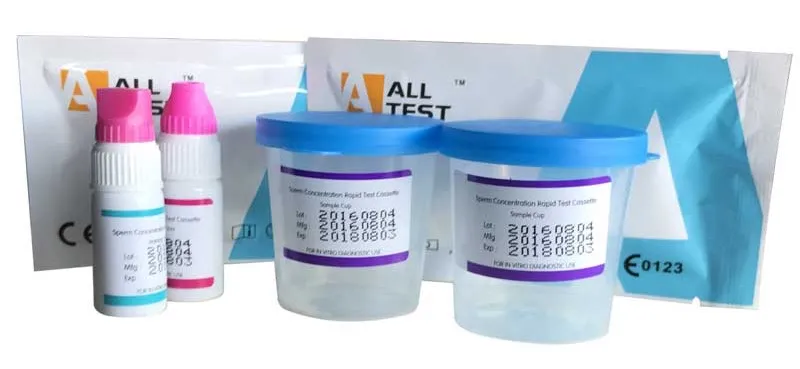More and more men are turning to at-home sperm testing to check their fertility in private. With male infertility accounting for around half of all fertility issues faced by couples today, it’s no surprise that easy access to sperm analysis is becoming increasingly sought-after.
If you and your partner are finding it difficult to conceive naturally, a simple at-home sperm test could provide some initial insight into whether your sperm count or quality may be a contributing factor.
Whilst a positive home sperm test doesn’t necessarily mean you don’t have a wider fertility problem, a negative result would indicate follow-up testing with your doctor may be advisable.
This article will cover everything you need to know about checking your sperm quality from the privacy of your own home.
Why Take a Sperm Test?
Historically, difficulties conceiving were thought to predominantly stem from female reproductive issues. Yet, recent research indicates the blame is far more evenly split between men and women.
In fact, male infertility accounts for around 30-50% of all infertility cases seen in fertility clinics today.
A landmark study published in 2017 in the journal Human Reproduction Update found that sperm counts in men from America, Europe, Australia and New Zealand had more than halved over a 40 year period ending in 2011.
On top of reductions in sperm count, the study also found the percentage of normally shaped sperm (morphology) had declined significantly amongst men from these regions.
Experts have theorised that the sharp declines in measurements of sperm quantity and quality could be tied to environmental and lifestyle factors. These include:
- Exposure to industrial or agricultural chemicals like pesticides, heavy metals, and solvents
- Smoking cigarettes
- Alcohol consumption
- Recreational drug use
- Poor diet and obesity
- Psychological stress
- Sedentary lifestyles and inadequate exercise
- Tight underwear and use of hot tubs or saunas
In addition to lifestyle and environmental elements, male fertility can sometimes be impacted by health conditions affecting the endocrine system or diseases impairing sperm production, such as:
- Varicocele (enlarged testicular veins)
- Undescended testicles
- Infections like epididymitis
- Ejaculation issues
- Antisperm antibodies
- Chromosomal or genetic disorders
- Damaged testicles
- Tumors
- Hormone imbalances
- Cystic fibrosis
- Mumps
- Medications
As you can see, a wide range of factors can potentially interfere with a man’s reproductive health.
If you’ve been unsuccessfully trying for a baby for 6 months or longer, it may be wise to rule out potential sperm deficiencies by taking a fertility test.
How Does Home Sperm Testing Work?
Home sperm test kits check for a minimum sperm concentration, which indicates whether or not your sperm count falls within a normal fertile range.
The World Health Organization defines anything under 15 million sperm per milliliter of semen as low sperm count, also known as oligospermia. A complete absence of sperm is known as azoospermia.
Most at-home sperm tests work by having the man collect a semen sample, then insert a testing stick coated in chemicals into the sample. The chemicals react if the sperm concentration exceeds a minimum threshold, displaying a positive result.
No color change indicates the sperm concentration likely falls below 20 million per milliliter, giving a negative test result.
Benefits of Home Testing
There are a number of potential advantages to using an at-home sperm testing kit:
- Privacy – For some men, producing a sperm sample at a clinic can provoke anxiety. Home testing allows you to collect a sample in comfortable, familiar surroundings.
- Convenience – Appointments at fertility clinics can take weeks or months to schedule. Home sperm tests allow you to screen sperm quality whenever suits you.
- Affordability – From just £10.99 per test, home kits are substantially cheaper than clinic testing. This allows you to check fertility multiple times if needed.
- Ease of use – Sperm test kits are designed to be uncomplicated to use, with clear instructions. The non-invasive sampling method is quick and hassle-free.
- Fast results – It takes just a few minutes to get your test readout. There’s no waiting around for lab results.
- Early screening – The accessibility of the tests means you can potentially identify fertility problems sooner.
- Peace of mind – Having an early indicator on your sperm health status can provide relief from uncertainty.
When to Take a Home Sperm Test
The American Society for Reproductive Medicine recommends men should consider semen analysis testing if:
- They have been attempting regular unprotected intercourse for 12 months or longer without success.
- Their partner is over 35 years old and they’ve been trying for 6 months without conceiving.
- They have known risk factors for infertility like a history of testicular trauma/surgery, recurrent infections, or undescended testicles.
- They have concerns about their sexual performance such as difficulty maintaining erections or ejaculating.
It’s advisable to have your first test at least 2-3 months after making any major lifestyle changes like quitting smoking, losing excess weight, or cutting back alcohol consumption or recreational drug use. This allows time for any improvements to manifest in sperm quality.
Pre-Test Preparation
The accuracy of your sperm test depends on adhering to the following guidelines before providing your sample:
- Avoid ejaculation – Refrain from any sexual activity leading to ejaculation for 2-5 days before taking the test. This ensures your sperm reserves build back up to optimal testing levels.
- Don’t use lubricants – Lubricants can interfere with the test chemicals, so avoid using them for 2-3 days beforehand.
- Limit caffeine and alcohol – Caffeinated or alcoholic drinks in the 72 hours prior to testing may influence results.
- Wear loose underwear – Tight shorts or underwear can raise testicle temperature leading up to testing, impacting sperm quality.
- Avoid fever – Illness accompanied by a high fever in the 90 days before testing can temporarily lower sperm count.
- Stay hydrated – Drink plenty of fluids like water the day before and day of testing to avoid an overly concentrated sample.
- Take your time – Ensure you do not feel rushed on the day of collection, so you can produce an adequate sample.
How to Collect a Sample
Follow these steps when using your home sperm test kit:
- Read the test kit instructions thoroughly. Never open any sealed test components until ready to take the test.
- Wash hands thoroughly with soap and water. Germs can contaminate the sample.
- Collect the semen sample by masturbation directly into the collection cup included with the kit. Make sure no spillage occurs.
- Set timer for 15 minutes. This allows the semen to liquefy, which is vital for accurate testing. Do not exceed 30 minutes.
- Once the sample has liquefied, give the collection cup a gentle swirl to mix. Unpack the testing stick.
- Follow kit directions for dipping the testing end into the semen sample for the specified time period (normally 2-5 seconds).
- Recap the testing stick and wait the directed amount of time for results to display. Avoid excess movement.
- Check results within the window specified by the test instructions to ensure accuracy. Note if positive or negative.
- Dispose of the collection cup and testing materials based on kit directions. Some require the samples to be sealed before disposal.
Understanding Your Results
If your home sperm test kit shows a positive result, it means your semen sample contained at least 20 million sperm per milliliter. This makes low sperm count unlikely, but does not give the full picture on your fertility.
Around 15% of infertile men still have normal sperm concentration. Other sperm indicators like motility (movement) and morphology (shape) cannot be measured by home kits.
Plus, fertility can depend on a wide range of factors relating to sexual performance, hormone levels, reproductive anatomy, genetics and lifestyle choices.
So whilst a positive home sperm test is encouraging, it should not be taken as a guarantee that you have no issues conceiving naturally. Continue trying, whilst making healthy lifestyle choices to optimize all aspects of reproductive health.
If your result is negative, it suggests your sperm concentration may be below 20 million per milliliter, which could make natural conception more challenging. This does not mean you are completely infertile.
The WHO states even men with sperm counts between 5-15 million have shown ability to conceive naturally, albeit sometimes taking longer. If you receive two negative home test results in a row, it would be advisable to arrange for clinic semen analysis and a doctor’s assessment.
Clinic testing not only verifies concentration, but examines motility and morphology in detail. They can also check for antisperm antibodies, hormone balance, and structural abnormalities.
Your doctor may request blood work or even genetic testing depending on exam and lab findings. They can then discuss options tailored to the specifics of your reproductive health.
In some cases, the solution may be as simple as making targeted lifestyle and dietary changes recommended by your doctor. For other infertility causes, procedures like surgery or prescription medications can be highly effective.
And innovations in fertility treatments, like IVF with intracytoplasmic sperm injection, give high success rates even with very low sperm counts. So whilst a negative home sperm test may feel discouraging, there are many paths forward you can discuss with your doctor.
Ways to Improve Male Fertility
If you’ve found yourself concerned with your reproductive health, there are practical steps you can take immediately to optimise fertility:
- Adopt a fertility diet – Focus on antioxidant-rich foods like berries, nuts and seeds. Increase vegetable intake, and choose whole grains and plant proteins. Limit trans fats, refined carbs and sugars. Stay hydrated drinking plenty of water.
- Exercise regularly – Shoot for at least 150 minutes per week of moderate activity like brisk walking. Balance with some strength training.
- Lose excess weight – Carrying extra weight, especially around the midsection, raises body temperature and can depress sperm production.
- Ditch unhealthy habit – Avoid smoking, recreational drugs, and limit alcohol. Even occasional use of these substances can be detrimental.
- Reduce stress – Adopt regular relaxation practices like light exercise, yoga, deep breathing, or meditation. Get 7-9 hours of quality sleep nightly.
- Avoid hot temperatures – Prevent overheating your testicles by avoiding hot baths, saunas, tight trousers, laptops directly on your lap, and long periods sitting in one position.
- Get any health conditions under control – Follow your doctor’s advice for managing chronic medical problems like diabetes that could affect fertility.
- Do regular self-checks – Conduct occasional testicular self-exams to catch any unusual lumps or changes in size early. Report concerns to your doctor promptly.
- Wear protective gear – Use appropriate protection during contact sports or hazardous jobs to prevent damaging testicular injuries.
- Choose loose underwear – Give your testicles ample space to keep cool by opting for boxers or loose shorts when possible.
- Use sperm-safe lubricants – Some lubricants can damage sperm, so select a fertility-friendly option like Pre-Seed if required.
- Take supplements selectively – Certain supplements like zinc and selenium have shown promise in improving some sperm parameters in deficient men. But get your doctor’s recommendation before starting supplementation.
Remember, factors affecting sperm quality and fertility can arise months before changes become obvious on testing. Having a healthy lifestyle along with regular self-checks establishes the best foundation for reproductive health long-term.
Seeing Your Doctor for Fertility Testing
Home sperm testing kits serve as a useful preliminary screening tool due to their convenience and accessibility. However, they have limitations in the data they can provide.
To gain a more detailed understanding of your individual fertility status, professional clinical semen analysis is essential.
During your appointment, your doctor will take a full medical history, asking about:
- Any previous conception successes or difficulties.
- Duration and frequency of any unprotected intercourse.
- Childhood illnesses like mumps that may have affected fertility.
- Sexual health factors like erectile performance and ejaculation.
- Past injuries or surgeries relating to the genital or groin area.
- Use of prescription, recreational, or performance enhancing drugs.
- Environmental or occupational exposures.
Your doctor will also ask about your lifestyle, diet, mental health, and conduct a physical exam.
They may then order blood work to check hormone levels and rule out genetic abnormalities like Y chromosome deletions or cystic fibrosis mutations. Imaging tests like scrotal ultrasounds can also be used to examine structural issues.
Once all information is collected, your doctor can determine if a full semen analysis is warranted. This more advanced sperm testing looks at:
- Volume – The amount of fluid ejaculated.
- Sperm concentration – Quantity of sperm per milliliter of semen.
- Motility – Percentage of sperm with proper forward movement. At least 40% is considered normal.
- Morphology – Proportion of sperm that appear normal without shape defects. Over 4% normal forms is optimal.
- White blood cell count – High levels may indicate infection or inflammation.
- Fructose levels – Low fructose can signify absent seminal vesicles.
- pH – Indicates whether semen acidity is within favorable range for sperm.
- Viscosity – Thickness of the fluid.
- Aggregation – Clumping of sperm.
- Vitality – The percentage of live, moving sperm.
If multiple sperm parameters fall below normal, your fertility specialist may diagnose a condition like oligospermia or asthenospermia.
They can then discuss appropriate treatment strategies to improve your chances of conception going forward. Medical approaches might include surgery, medications, or procedures like intrauterine insemination (IUI) or in vitro fertilization (IVF).
For many couples struggling with infertility, comprehensive sperm testing combined with your doctor’s expertise offers the best avenue for overcoming barriers and successfully starting your family. So while home sperm tests serve a useful purpose, seeking professional guidance based on your full clinical picture is key.
Starting a family is for many couples the most profoundly meaningful experience in their lives together. If you have concerns about your fertility, the wide range of available self-checks, clinical tests, and proven treatments today offer more hope than ever before of making that dream a reality.
Photo by Zoom Baby
Zoom Baby is a leading supplier of Pregnancy Tests and Ovulation Test Kits






